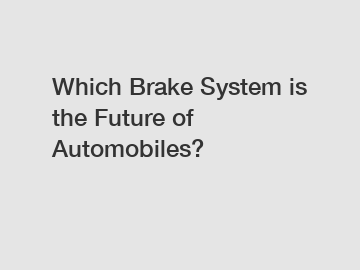Jan. 19, 2024
Transportation
You will get efficient and thoughtful service from Tongda.
Which Brake System is the Future of Automobiles?
As technology evolves, it brings forth new innovations that shape the future of various industries. The automotive sector is no exception, constantly exploring ways to enhance safety and performance. One crucial aspect of any vehicle is its brake system, responsible for ensuring reliable and efficient stopping power. With advancements in both traditional hydraulic brakes and emerging technologies like regenerative braking and brake-by-wire systems, the question arises: which brake system holds the key to the future of automobiles?

1. The Rise of Regenerative Braking:
Regenerative braking has gained significant attention in recent years, particularly in the realm of electric vehicles (EVs). This technology enables the recovery of kinetic energy produced during braking and converts it into electrical energy, which is stored in the vehicle's battery. As EVs continue to grow in popularity, regenerative braking offers numerous advantages, such as improved energy efficiency and extended battery range. However, its effectiveness is limited in conventional internal combustion engine (ICE) vehicles, as they lack the necessary energy storage infrastructure.
2. The Evolution of Hydraulic Brakes:
Hydraulic braking systems have been the norm in automobiles for decades, relying on pressurized fluid to transmit the force applied by the driver to the braking mechanism. Although this technology is tried and tested, it has its limitations. The hydraulic brake system requires regular maintenance, including fluid replacement and caliper adjustment. Moreover, it is not suitable for energy recovery, resulting in wasted kinetic energy during braking.
3. Exploring Brake-by-Wire Systems:
Brake-by-wire systems represent an innovative approach to braking, removing the mechanical connection between the brake pedal and the braking mechanism. These systems use sensors to detect the force applied by the driver and transmit this information electronically to the brakes. By eliminating the physical link, brake-by-wire systems offer potential advancements in vehicle control and safety. However, concerns remain regarding the reliability and redundancy of electronic systems in critical brake applications.
4. The Future Integration of Brake Systems:
Rather than relying solely on a single brake system, the future of automobiles may lie in the integration of multiple technologies. Hybrid brake systems, for example, could combine regenerative braking with hydraulic or brake-by-wire systems to maximize energy recovery and minimize mechanical wear. This approach would offer drivers the best of both worlds – the efficiency of regenerative braking and the reliability of traditional hydraulic or brake-by-wire systems.
In conclusion, the future of automobile brake systems is a complex and evolving landscape. While regenerative braking holds immense potential, its widespread use is currently limited to electric vehicles. Hydraulic brakes, on the other hand, have been the standard for years but lack energy recovery capabilities. Brake-by-wire systems present an intriguing alternative but require further research and development to address reliability concerns. The ideal solution may involve integrating multiple brake technologies, allowing for energy recovery while maintaining the safety and dependability of traditional systems. As technology progresses and consumer demand grows, the automotive industry will undoubtedly continue to push the boundaries of brake system advancements, ultimately determining the future of braking in automobiles.
For more OEM Passenger Car Semi-metallic Brake Padsinformation, please contact us. We will provide professional answers.
Previous: Efficient & Cost-Effective Industrial Gas Mini Tanks: Your Ultimate Solution!
Next: Decoding Automobile Brakes: Types & Performance Unveiled
If you are interested in sending in a Guest Blogger Submission,welcome to write for us!
All Comments ( 0 )